A IIITH alumni rapid response team saves 1,000 lives in a month, at the peak of the pandemic. The passionate volunteer group is connecting critical Covid patients to vital medical services and financial aid, helping India fight back the 2nd wave of the pandemic.
The Covid War Room (CWR) comprising of IIIT-H alumni and students, was put together in response to a deluge of appeals for crucial assistance for Covid patients during the second wave in April-May 2021. To date, the team has resolved 1,107 requests and processed over Rs. 40 lakhs in financial aid and the happiness figures are still rising.
“When I started out, my intent was to save just one life”, remarked CWR founder Sriharsha Karamchati, the brainchild behind this lighthouse of support. He has created a technical eco-system of support through a volunteer army and crowd-sourced data and funding. “Our basic purpose is to take the mental load off the patient’s attendant and give him/her precious time with the patient, while we provide remote assistance and hand-holding till the problem is resolved”. The critical patient’s attendant makes a single call to the Covid war room. The CWR respondent runs the request, whether it is for hospital beds, ventilators and oxygen support devices, medicines or blood, through its extensive data base of resources and verifies its availability. The verified information is then relayed back to the attendant for immediate action.
Adding Magical Minutes to critical care
“Our modus operandi is simple”, explained Sriharsha. “We take the request, calm the attendant down and ask them to spend time with the patient. Once we source the request, we verify the details, set up the bed, ambulance or oxygen support and organize crowd-funding, if the person is unable to pay, as per the need. The bottomline is that you are able to add magical minutes of comfort to the attendant and connect them to the required resources seamlessly”. It stemmed from an acute awareness that a patient’s attendant is emotionally burdened and does not have the mental bandwidth or time to reach out to the right sources for help or verify the large amount of unsubstantiated data that comes his way.
As the 2nd wave started spiking and social media blew up with frantic requests for help, Sriharsha reached out to a few key resources in his esoteric world and a task force was created. Thus was born the remote and decentralized Covid War Room, populated by IIITH’s alumni, your regular IT whiz-kids, working professionals, start-up founders and college students. The group has doctors, IIITH engineers, parents who are nodal officers, NGO heads, hospital owners and IAS officers. The backend processes were conceptualized and designed by core team member Mohit Jain, IIITH alumnus & Sudhir Yarram, a Ph.D scholar working in the computer vision space. “We used a Ziffy platform to set up the helpline”, informed IIITH alumnus Anupriya Inumella of Microsoft, who put together the call center to process requests from across the nation.
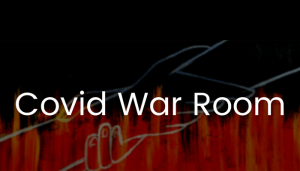
Twitter post creates a flutter
It all began on April 27th, when Sriharsha Karamchati, co- founder of the start-up Questbook opened his Twitter feed to find it filled with urgent pleas for plasma, medicines, oxygen and ventilator beds for Covid patients. Driven by guilt, he decided to take a couple of days off to see what he could do about the bloodbath on the Net. His Questbook co-founder helped him to quickly put together a small website called Covid.questbook.app which offered creative services in return for monetary donations for any Covid cause. “I will make an ad for your company if you donate 50k for any COVID cause of your choice” was the eye-ball grabbing shout out. This enabled INR 60L worth of donations till date.
The first request that Sriharsha received was from a disconsolate daughter who had lost her mother to Covid and needed to raise 1.5 lakhs a day for her critically ill father. ‘Donate 350 rupees that you would spend on a Swiggy meal’ was an Insta post that touched hearts and by the next morning, donations started rolling in, including a hefty donation from Samrat Nagarjuna, a 2007 alumnus.
‘She could save her father for one more day’ was the follow-up Instagram post and by next morning, he had 6 lakhs funded! Though her father perished, her words of gratitude touched a chord. Sriharsha Karamchati was astounded at the impact that his Twitter-Instagram posts had on financial aid and volunteer sign-ups. He reached out to his close friends and put his request for volunteers to join him, in the IIITH Life Facebook page. The next day he had 250 volunteers from IIITH students and alumni!
His Instagram post, “I can help you find hospital beds, medicines, plasma donors” gained a lot of traction and found its way into the mailing lists of the Oxford University, Apple, Amazon and Google in the US, Singapore and Australia. Every day, team members put up a personalized Instagram post that reads ‘DM Me. I will help you with hospital bed requests’. This is retweeted and blitzes through cyberspace, creating a groundswell of anonymous support.
Distributed centers of high activity
When IIITH alumni and students joined the War Room, they converted the forum into a high tech platform overnight, creating Slack groups, building slack bots and automating several processes. A graphical representation of data on a comprehensive dashboard illustrates, in real time, the status of requests received and resolved. It is a decentralized, open source equivalent platform.“We get crowd sourced updated information constantly and you can see real-time data of the impact we are creating across the geographies here “ says Anupriya.
https://datastudio.google.com/u/0/reporting/fcc60ca3-8f71-4da8-8c6a-f7859d65facd/page/V1hGC
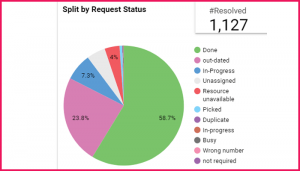
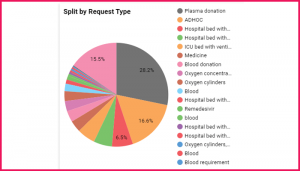
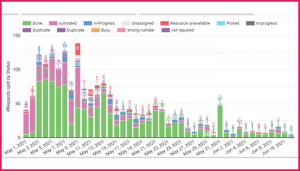
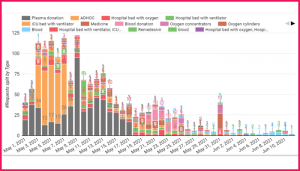
There is a thorough on-boarding process that links volunteers to a Slack channel with short videos to explain work flows. The volunteer is added to sub groups on WhatsApp that fulfils a specific requirement, be it medicines, blood or bed for Covid and non-Covid patients. “The War Room has a team of doctors for remote consultation, a pharmacy college students team, hospital owners as well as IAS and IPS officers who are our final line of defense, when all else fails”, disclosed gold medalist Apoorva Srivastava, a 2nd year IIIT-H student.
We Trust but Verify
There are dedicated teams for requests, for resources and for verification. “People are comfortable in donating their aid through us since they know that we have a robust background verification team that is validating everything including medical history, bills and family background of patients”, said Sudir Yarram. The core 10-member team includes Goodclap, the fund-raising venture who were one of the first members on the CWR team. The verification of resources is undertaken by the parents of volunteers, 40+ age group members who bring their time-tested people-skills to create connections with reliable sources in different domains.
The team created a Data Studio where people can actually see where the funds go. “We have donated Rs. 5.5 lakhs towards setting up of 45 oxygen beds and 15 ICU beds in Kukatpally”, said Anupriya Inumella. In Agra, 350 ration kits were distributed among the rickshawallah families who had lost their main breadwinner. The CWR has raised an equivalent of Rs.60 lakhs and bought 20 oxygen concentrators from Australia, now being leased as a free service. A donation of Rs. 3 lakhs towards registration will get 1,00,000 villagers vaccinated at a village in Turkayamjal municipality, Telangana over the next 45 days. Close to Rs.15 lakhs have been donated in financial aid, especially for underprivileged children with medical emergencies.
A nation-wide link of helping hands
IIITH alumni – Anupriya, Guruprakash & GV Chaitanya, have been front-lining the tie-up efforts with Tier 2, 3 and 4 cities and villages and have set up a call center to process patient requests from different parts of the country – Ajmer, Bhopal, Delhi, Rajasthan, Bangalore, Hyderabad and districts within Telangana and Andhra Pradesh. Posters with contact details are being put up in government hospitals. “We had 2,000 requests of which 1,700 have been processed with a 60% success rate”, said Anupriya. “At any given time, at least a 100 of the 500 strong volunteer team is online, processing SOS requests”. Whether it is assistance for a lung transplant or airlifting ECMOs, there is a modulated format with a large database and significant collaborations with IT Minister teams and BITS Alumni associations.
How does one seek help?
Anyone who needs help can reach out to the Covid War Room Helpline 6304296587 or DM their Covid-related requests to the Instagram handle https://www.instagram.com/sriharshakaramchati/ or tag the Twitter handle https://twitter.com/HarshaKaramchat
“When this wave dies down, I still want people to remember that there is a proactive group of individuals who are taking accountability. That is the color I want to paint the world with”, noted Sriharsha. He credits the success of the War Room to the incredible group of volunteers who just want to help and their ability to take responsibility, bring in the right technology to organize and structure the workflow to scale quickly.
Here is the list of these beautiful souls: https://docs.google.com/spreadsheets/d/1APJSEy1g3yUAoWOrYoX70pyRWL6lEKAiFCdqTnkGXrA/edit?usp=sharing
Who counsels the counsellor?
Speaking to a traumatized attendant takes an emotional toll on the task force responders. For the many heart-wrenching tragedies that the team witnesses, there are an equal number of heartening stories. “We have created special WhatsApp sub-groups for our members to chill; where members can unwind and share a joke, movie clips and music. There are even paintings, digital art comics and cakes being exchanged, to deal with the angst and take the edge off the tragedies that surround their virtual space constantly”, remarked Sriharsha. Heartening stories of survival fill the group every day; like stories of a critical pregnant mother delivering a healthy baby or oxygen support reaching a patient, against all odds.
“The night requests are more burdening”, revealed Apoorva. “The biggest high, however, is the bonding in our groups and the ecosystem of appreciation and collaboration. If an SOS call gets difficult, we reach for help on WhatsApp and within minutes, we have already created a critical mass of support”.
Who will pack your parachute for the next wave?
Looking ahead, Sriharsha believes that our broken healthcare system needs to be fixed. Even before the pandemic, there were 50 million deaths annually in India, due to lack of access to basic health care and unhygienic living conditions. While it is in our DNA to be optimistic, we need to look at the negatives, take the lessons on the chin and be prepared for the next wave.
Sriharsha realizes that people have the intent but don’t have the wherewithal to assist. “This War room is here to stay and we need volunteers. “If you can spare 15 minutes to make calls or take down requests, you can help”, says Sriharsha. We plan to collaborate with as many on ground NGOs as possible to spread the reach of help and also to ensure that we bring in technology to avoid reworking on the same request by multiple volunteering groups.
Says Sriharsha, “To volunteer you can fill up the form here https://forms.gle/8jgq5uojjQF9wEjX7, and our team will reach out to you for onboarding. Helping without an expectation is a habit that one should inculcate and I can assure you that you will sleep with pride and wake up with responsibility”.



